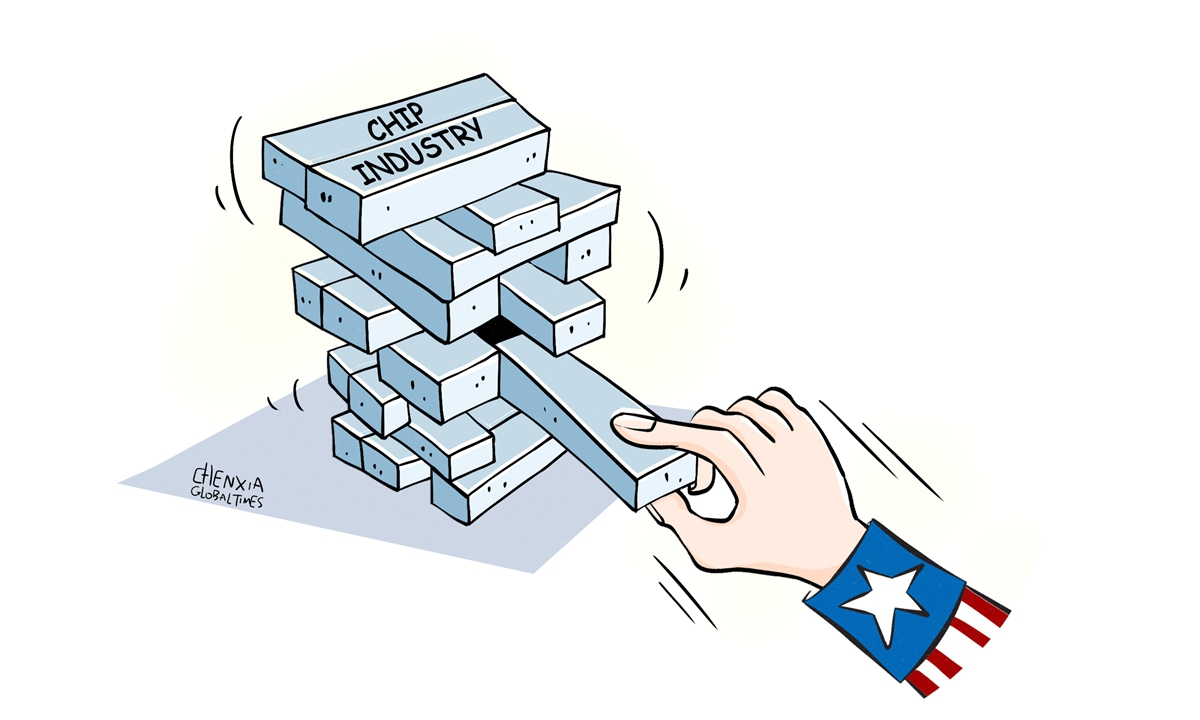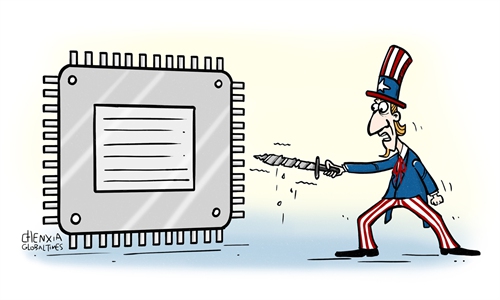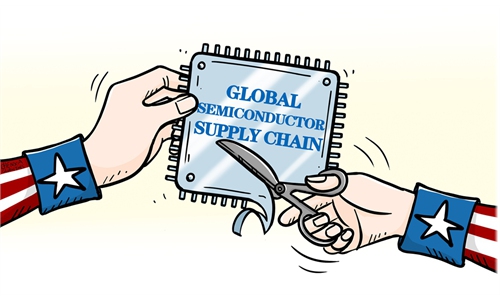
Illustration: Chen Xia/GT
It seems that the recent developments surrounding US export controls on advanced artificial intelligence (AI) chips underscore its deepening anxiety in the face of China's technological advancement. Its reliance on an escalating chip blockade, aimed at preserving US technological hegemony, is a short-sighted approach that won't help in enhancing the competitiveness of the AI industry in the US and curbing China's technological progress in this crucial field.A US lawmaker plans to introduce legislation in coming weeks to verify the location of AI chips like those made by Nvidia after they are sold, Reuters reported on Monday. The move aims to address so-called reports of smuggling of Nvidia's chips into China, the report said.
The news comes just a few days after Nvidia blasted AI startup Anthropic in a rare public clash.
After Anthropic argued for tighter export controls on AI chips to China and enforcement, claiming smuggling tactics involved chips hidden in "prosthetic baby bumps" and "packed alongside live lobsters," a spokesperson for Nvidia said that "American firms should focus on innovation and rise to challenge, rather than tell tall tales," according to CNBC. Anthropic is an AI start-up backed by billions from Amazon and relies heavily on Nvidia hardware to train its models, CNBC reported.
The latest developments, from the proposed legislation to track chip locations to groundless claims about chip smuggling to China, are a clear manifestation of the "small yard, high fence" mindset of technology blockade in the US.
Behind these lie Washington's growing unease about China's rapid technological advancement. As China accelerates its breakthroughs in chip technology and ramps up alternative research, development and production, some in the US have become increasingly extreme and paranoid in their attempts to tighten export controls.
However, the US seems to have forgotten a fundamental truth: technological development advantages have never been achieved through blockades and containment.
The US technology blockade reveals a fundamental misunderstanding of the true essence of innovation. Widely recognized as the key of the next wave of technological revolution, AI flourishes not based on tech barriers, but rather on innovation.
The US government's efforts to maintain its competitive edge by stifling the development of AI technologies in others is a misguided strategy that ultimately undermines its own interests. Rather than bolstering its own AI industry, such measures risk harming the interests of US enterprises.
Using 20th-century geopolitical tactics to cope with a 21st-century technological revolution will only produce the opposite effect. There are already examples of this, and there will be more.
Since 2022, the US government has restricted the export of Nvidia's high-end chips to China in an attempt to delay China's AI development through the "small yard, high fence" strategy. However, the recent emergence of DeepSeek, which has achieved significant breakthroughs in AI capabilities despite operating under low computational power, serves as a compelling testament to the resilience and ingenuity of China's technological landscape. This development underscores the futility of attempts to stifle China's innovation.
In the AI field, China has demonstrated remarkable innovative spirit. According to the World Intellectual Property Organization, China has emerged as the leading country in terms of AI-related patent holdings globally, accounting for 60 percent of the world total, according to Xinhua News Agency.
China's AI industry surpassed 700 billion yuan ($96.06 billion) in 2024, having sustained a growth rate of more than 20 percent for several consecutive years, according to a report released by the China Center for Information Industry Development last month.
While the path to breakthroughs in China's chip industry is undoubtedly fraught with challenges, more and more Chinese companies are delving into chip research and development, making strides in all aspects of the industrial chain, from equipment and materials to design, in an effort to reduce reliance on external technologies. History has proven, and will continue to prove, that no external blockade can impede the innovative progress in China.



